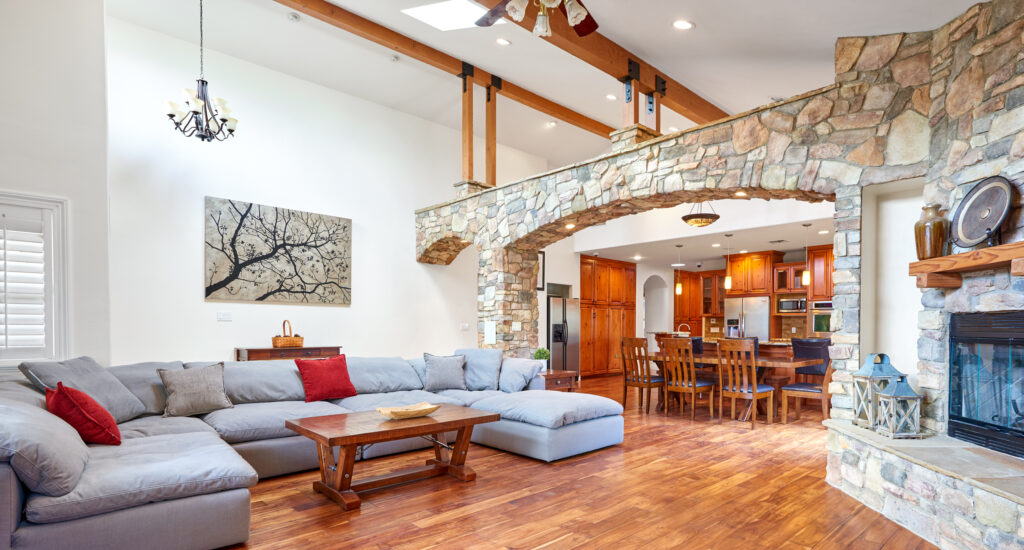Residential rehab, also known as inpatient rehab, plays a vital role in the recovery process for those grappling with severe substance use disorders or co-occurring mental health conditions. Inpatient rehabs offer a range of benefits and comprehensive support, providing a safe and structured environment for individuals to overcome their challenges and build a robust foundation for lasting sobriety.
The core benefits of residential rehab treatment include:
- Around-the-clock care: Residential addiction treatment offers around-the-clock support with access to assistance and guidance on demand.
- Structured schedule: With scheduled therapy sessions and activities, residential rehab provides a structured environment that promotes routine, stability, and progress.
- Safe and secure housing: Residential rehab centers offer secure housing, creating a stable and nurturing environment conducive to healing and recovery.
- Medical care: These programs include medical professionals who can address any health concerns and provide appropriate treatments throughout the recovery process.
- Therapeutic interventions: Residential rehab implements various evidence-based therapeutic interventions to help individuals learn and practice strategies for living a drug- and alcohol-free life.
- Additional services: These programs assist individuals in identifying and accessing additional services such as case management, therapy, housing support, and legal assistance after completing the program.
Residential rehab provides an immersive and focused experience that allows those with addictions to detox safely under medical supervision, develop effective coping mechanisms, and acquire the necessary skills to maintain their recovery beyond the initial treatment period. By removing the distractions and triggers of everyday life, residential rehab offers a supportive environment where individuals can focus fully on their recovery journey.
Not everyone in recovery needs residential rehabilitation treatment programs, though. Inpatient rehab – typically short-term and intensive – is often utilized in emergency situations for detoxification or stabilization. It is usually based in rehab or hospital settings and serves as a crucial starting point for recovery. After inpatient care, individuals may transition to other levels of care such as PHPs (partial hospitalization programs), IOPs (intensive outpatient programs), or regular outpatient treatment programs, depending on their specific needs.

Types of Residential Rehab
Residential alcohol rehab, drug rehab, and mental health rehab are three essential types of residential treatment programs that cater to individuals struggling with specific challenges. Each program addresses unique needs and provides specialized care to promote recovery and overall well-being.
Alcohol Rehab
Alcohol rehab programs offer a specialized setting for people battling alcohol addiction. Inpatient addiction treatment programs for alcohol provide a range of tailored treatments and interventions to help individuals overcome their dependence on alcohol and build a healthier, sober lifestyle. Key features of alcohol rehab include:
- Medical detoxification: Before embarking on the recovery journey, individuals undergo a medically supervised detoxification process to safely manage withdrawal symptoms and cleanse their bodies of alcohol and toxins.
- MAT (medication-assisted treatment): Alcohol rehab programs may incorporate MAT, utilizing FDA-approved medications like naltrexone, acamprosate, or disulfiram to help reduce cravings, prevent relapse, and support long-term sobriety.
- Psychotherapy and counseling: Therapeutic interventions, including individual counseling and group therapy, provide a safe space for individuals to explore the underlying factors contributing to their alcohol addiction, learn coping strategies, and develop healthier behavioral patterns. Psychotherapies like CBT (cognitive behavioral therapy) are commonly combined with medications to treat alcoholism.
- Holistic therapies: Alcohol rehab programs often incorporate holistic approaches like mindfulness meditation, yoga, art therapy, and outdoor activities. These therapies help individuals reconnect with themselves, manage stress, and develop a holistic approach to their recovery.
Drug Rehab
Residential drug rehab programs focus on helping individuals overcome substance use disorders involving illicit drugs or prescription medications. Drug rehab programs provide comprehensive care to address the physical, psychological, and social aspects of addiction. Here are some key aspects of drug rehab:
- Individualized treatment plans: An effective drug center will develop personalized treatment plans tailored to each individual’s unique needs, accounting for the specific substance of abuse, the severity of addiction, and any co-occurring mental health conditions.
- Dual diagnosis support: Many individuals struggling with addiction also face co-occurring mental health disorders. Drug rehab programs offer integrated treatment to address both addiction and mental health challenges simultaneously, ensuring a holistic recovery approach.
- Behavioral therapies: CBT (cognitive behavioral therapy), motivational interviewing, and contingency management are some of the evidence-based behavioral therapies employed in drug rehab programs. These therapies help individuals develop new coping skills, manage cravings, and prevent relapse.
- Community and peer support: Group therapy sessions and peer support groups are integral components of drug rehab programs. They provide individuals with a sense of community, empathy, and understanding, fostering connections and support throughout the recovery journey.
Mental Health Rehab (For Co-Occurring Disorders)
Residential mental health rehab programs cater to individuals facing co-occurring disorders, where addiction and mental health conditions intertwine. These programs offer integrated treatment to address both aspects comprehensively. Here’s what to expect from mental health rehab:
- Assessment for co-occurring disorders: Mental health rehab programs conduct thorough assessments to identify the presence of co-occurring disorders and develop customized treatment plans that address the unique challenges presented by these interconnected conditions.
- Psychiatric care: With a focus on mental health, these programs provide access to psychiatric professionals who can prescribe appropriate medications and offer ongoing psychiatric support throughout the individual’s stay.
- Evidence-based interventions: Various evidence-based therapies, such as CBT, DBT (dialectical behavior therapy), and trauma-focused therapy, are utilized to help individuals manage their mental health symptoms, develop healthier coping strategies, and prevent relapse.
- Wellness and self-care: Mental health rehab programs emphasize holistic wellness and self-care practices to support individuals in their recovery journey. This may include mindfulness exercises, meditation, expressive arts therapy, and physical activities tailored to promote emotional well-being.
Residential rehab programs provide a transformative and healing experience for individuals struggling with addiction and mental health challenges. By offering specialized care, personalized treatment plans, and a supportive community, these programs empower individuals to reclaim their lives and build a firm foundation for lasting recovery.

Residential Rehab FAQs
What is residential rehab like?
Residential rehab provides a structured and supportive environment for individuals seeking addiction treatment, offering a range of therapies and activities to promote recovery.
How long is residential rehab?
The most common residential rehab programs last for 30, 60, or 90 days.
What does it mean when someone goes to rehab?
When someone goes to rehab, it means they are seeking professional help and support to address their substance abuse or addiction issues and work towards recovery.
Is residential rehab the same as inpatient rehab?
Residential rehab and inpatient rehab are terms that are used interchangeably to refer to the same type of treatment, where individuals reside in a treatment facility and receive intensive therapy and support for their addiction.
What are three options for drug abuse treatment?
Three options for drug abuse treatment include residential rehab (inpatient treatment), outpatient programs, and medication-assisted treatment (MAT), which combines medication with counseling and behavioral therapies.

Find Residential Rehab Treatment for Drug and Alcohol Addiction at Gratitude Lodge
Discover the path to overcoming addiction and mental health challenges at Gratitude Lodge, situated in Newport Beach and Long Beach, CA.
Our compassionate team provides pet-friendly rehab centers, offering comprehensive treatment programs that include supervised medical detox, 30-day residential rehab programs, medication-assisted treatment, psychotherapy, group and individual counseling, family therapy, holistic therapies, and aftercare support.
Take the first step towards lasting recovery by contacting our admissions at 800-994-2184.




























